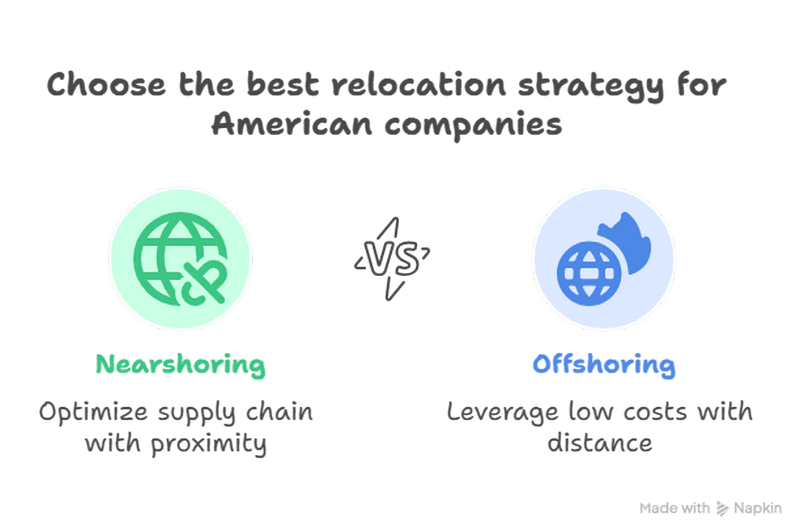
Let the Data Speak
According to recent data from the Bank of Mexico and the Ministry of Economy, foreign direct investment (FDI) from the United States in Mexico’s manufacturing sector grew by 18% in 2024, reaching a record of over 12 billion dollars.
Additionally, a Deloitte study reported that 62% of American companies are either considering or have already started moving part of their production to Mexico under the nearshoring strategy.
These figures reflect sustained growth and increasing confidence in Mexico as a strategic partner for regional manufacturing.
Explore the Mexico Manufacturing Advantage
Factors That Make Global Supply Chains Vulnerable
Several recent circumstances have highlighted the fragility of international supply chains. For example, geopolitical tensions have created uncertainty in global distribution, along with rising costs in Asia—including labor and freight—that have diminished the competitive advantage of these regions.
These factors have driven American companies to seek safer and more efficient alternatives for manufacturing and product distribution.
Mexico as a Strategic Solution
Mexico has positioned itself as a primary strategic destination for American companies seeking to optimize their supply chains and strengthen their manufacturing capacity. Several reasons converge to make this country an unbeatable option:
Geographical Proximity and Optimized Logistics
The geographical proximity between Mexico and the United States is one of the greatest advantages for foreign trade. Sharing an extensive border allows American companies to benefit from reduced transit times and lower transportation costs compared to transoceanic routes.
This closeness is essential for implementing advanced logistics strategies such as Just-in-Time (JIT), where components and products can move quickly and efficiently exactly when needed, minimizing storage costs and working capital tied up in inventory.
Furthermore, the robust network of highways, railways, and border crossings facilitates a steady and predictable flow of goods, ensuring production and distribution remain smooth and agile.
Trade Agreements and Legal Certainty
The backbone of the commercial relationship between Mexico and the U.S. is the United States-Mexico-Canada Agreement (USMCA). This agreement not only eliminates most tariffs among member countries but also establishes clear and detailed Rules of Origin.
The USMCA, along with Mexico’s other trade agreements worldwide, provides legal and tariff certainty highly valued by foreign investors, enabling safer and more predictable long-term planning.
Skilled and Competitive Workforce
Beyond operational costs, Mexico stands out for its highly skilled and competitive labor force. The country has invested significantly in technical and professional education, developing a new generation of engineers, technicians, and specialized operators in high-demand areas.
This is particularly evident in key sectors such as automotive, aerospace, electronics, and medical devices, where expertise and precision are essential.
The high productivity of the Mexican workforce, combined with competitive wages, ensures that companies not only save costs but also maintain or improve product quality.
Robust Infrastructure and Digital Connectivity
To support the influx of manufacturing, Mexico has developed robust and modern industrial infrastructure. This includes an extensive network of world-class industrial parks offering strategic locations, security, and all basic services such as electricity, water, and sanitation.
Additionally, advanced digital connectivity is a fundamental pillar for modern operations, enabling system integration, efficient communication, and the use of Industry 4.0 technologies. The availability of these resources ensures that companies can establish and operate without significant interruptions.
Consolidated Industrial Clusters
The concentration of similar and related industries in certain regions of Mexico has led to the formation of highly efficient industrial clusters. These clusters (for example, the automotive cluster in Bajío or the aerospace cluster in Querétaro) create a supportive ecosystem where proximity among suppliers, manufacturers, academic institutions, and research centers fosters innovation, knowledge exchange, and collaboration.
This industrial density facilitates access to a well-developed local supply chain, reduces dependence on distant suppliers, and allows for greater specialization and optimization of production processes.
Human Capital and Industrial Ecosystem
The success of manufacturing moving to Mexico is not only due to economic and geographic factors but also to the quality of its human capital and the maturity of its industrial ecosystem.
One of the most significant advantages is the availability of bilingual talent, especially in English, which greatly facilitates communication and integration with operations and teams in the United States. This language skill is complemented by a collaborative and adaptable mindset within the Mexican workforce.
Professionals and technicians are accustomed to working under international standards and quickly adapt to new technologies and production methodologies, fostering a dynamic and efficient work environment.
Experience in High Value-Added Manufacturing
Mexico is not just a destination for low-cost manufacturing; it is a center for high value-added manufacturing. Decades of experience producing complex goods for demanding markets have equipped the country with the capacity and knowledge to manage favorable processes.
American companies can rely on Mexican expertise to produce high-tech components that require precision, rigorous quality control, and compliance with international regulations.
Trust in the Expertise of American Industries
The privileged location between the United States and Mexico is key to facilitating the transition and operation of companies deciding to move their production to Mexico. At American Industries, we offer specialized services such as RBI (Receiving, Billing, and Inventory) and Receiving Warehouse, which optimize inventory management and customs processes, ensuring efficiency and regulatory compliance.
If your company is considering a strategic change in production, contact us to discover how we can help you leverage the benefits of nearshoring and maximize your success in the region.



